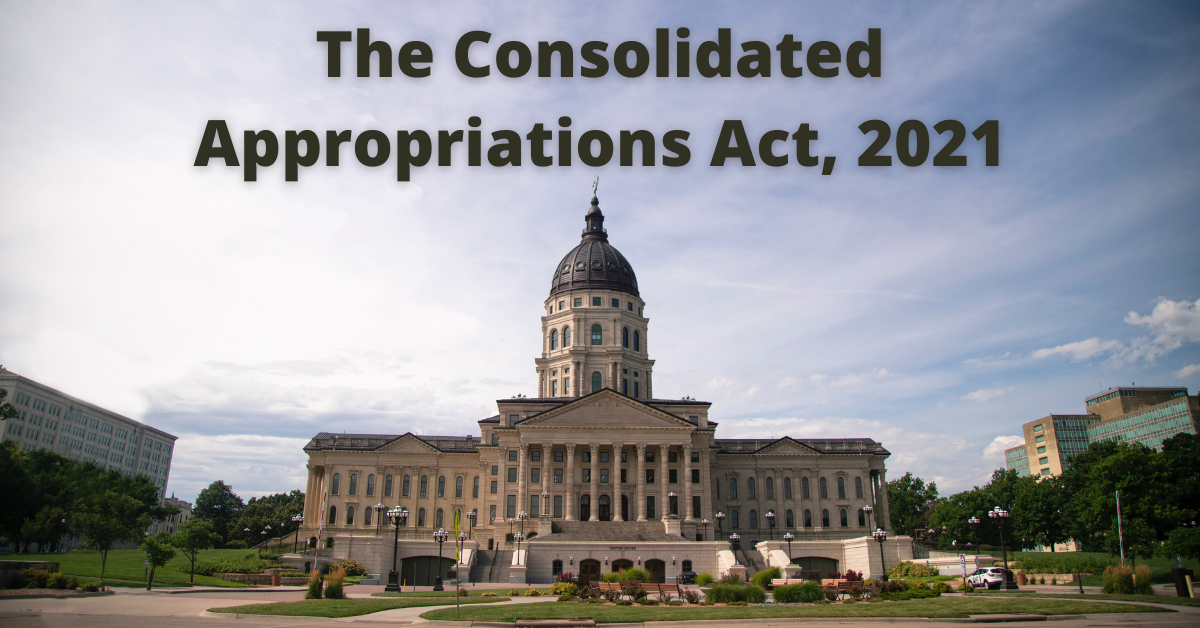Finally, More Money! – The Consolidated Appropriations Act, 2021

It must be a Christmas miracle. After deadlocking this summer and delaying over the weekend, the United States Senate and the House of Representatives have agreed to additional aid to those impacted by the COVID-19 pandemic. The President has also signed this new bill, known as the “Consolidated Appropriations Act, 2021” (the “Act”).
The Act is approximately 5,000 pages long, so a detailed analysis will take some time. Therefore, this post is not intended to be comprehensive, and many items are still being hammered out. Here’s what we know so far:
The Bare Bones
The Act consists of $900 billion in aid and was a compromise between the two parties. As such, it is not perfect. There are some aspects of the Act that both sides of the aisle are criticizing.
Here are some highlights of what Congress has allotted:
$68 Billion for Vaccine Distribution and COVID-19 Testing Costs
$325 Billion in Aid for Small Businesses
- $284 billion of that will go to the U.S. Small Business Administration (the “SBA”) for the first and second PPP loans (which are forgivable). Also, part of that $284 billion to the SBA is $20 billion for Economic Injury Disaster Loan Grants (“EIDL Grants”).
- $15 billion of funding will be directed to live venues, independent movie theaters, and cultural institutions.
- $12 billion of funding will be set aside to help businesses in low-income communities and minority communities.
$45 Billion for Transportation Funding, of that
- $16 billion for airlines
- $2 billion for airports
- $1 billion for Amtrak
- $14 billion for transit systems (such as SEPTA)
- $10 billion for state highways
$120 Billion for Expanded Unemployment
- Expanded unemployment will include an additional $300 per week supplement from December 26, 2020 through March 14, 2021.
- The expansion also extends the Pandemic Unemployment Assistance (PUA) program that permits self-employed and gig workers to apply for unemployment.
$160 Billion for Direct Payments to Individuals
- $600 to U.S. citizens or green card holders who have an AGI less than $75,000. This stimulus is significantly less than the $1,200 per person granted by the CARES Act.
- Persons with AGIs over $75,000 will have their credit reduced by $5 per every $100 in income.
- $600 to dependents under the age of 17. This allocation does not include adult dependents, such as elderly parents.
- Social Security recipients will receive their checks automatically.
- The Treasury Secretary stated on CNBC that Americans will be receiving direct payments starting December 28, 2020. As the Act was delayed over the weekend, do not expect payments to roll out that week. Perhaps the first full week in 2021 is a more realistic target.
- The President also indicated that he wished for $2,000 in payments instead of the $600. Democrats have proposed a small additional bill that would replace the $600 for $2,000.
$13 Billion for Emergency Food Assistance
This includes a 15% increase in SNAP payments (food stamps) for six months.
$25 Billion in Emergency Rental Aid
The Act also includes an extension of the national eviction moratorium through January 31, 2021.
$82 Billion in Funding for Colleges and Schools
This includes funding to repair and replace HVAC systems to mitigate the transmission of COVID-19.
$22 Billion for Health-Related Expenses Incurred by State and Local Governments
PPP Loan Change Highlights
- Businesses may deduct business expenses paid with forgiven PPP loans.
- Section 501(c)(6) non-profit organizations are now eligible for PPP loans.
- Businesses with severe revenue reductions may apply for a second PPP loan.
- There will be a new Simplified Forgiveness Application (yes, another one) for loans under $150,000. The SBA must create this application form within 24 days of the Act’s enactment.
- PPP borrowers are no longer required to deduct the amount of any EIDL advance from their PPP forgiveness.
- More to come on PPP and the possibility of a second round of PPP loans in a later blog post.
Miscellaneous Business Changes
- The Act extended the employee retention tax credit that was passed earlier this year.
- The Act also includes the widely criticized “three-martini lunch” tax credit. This credit permits businesses to deduct 100% of the expense for meals so long as the expense is for food or beverages provided by a restaurant. Qualifying expenses must occur between January 1, 2021 and the end of 2022.
Laws and regulations remain a moving target for COVID-19 related relief. As such, the laws and regulations discussed today may change. Please consult with a legal professional regarding the updates to the Act if you have any legal concerns.
